8Siebel Templates for Employee Applications
Siebel Templates for Employee Applications
This chapter describes the predefined templates that Siebel CRM uses in an employee application. It includes the following topics:
Overview of Configuring Siebel Templates for Employee Applications
This topic describes an overview of configuring Siebel templates for employee applications. It includes the following topics:
Guidelines for Configuring Applet Templates
If you configure an applet template, then use the following guidelines:
Never map a native HTML button to a list or form. You can set the properties for a MiniButton the same way you set the properties for most controls.
To save time during configuration, you can place the button divider after the menu button and before the previous record button.
To maximize the potential for vertical alignment, place taller fields, such as text area fields, at the ending part of the form. Siebel CRM displays each column of fields independently of the other columns. This configuration maximizes form layout options and minimizes gaps that might occur between fields in the same column but where the alignment of fields across columns might not remain vertical.
To define the text that Siebel CRM displays in the client, you can map the control on a label and use the Caption property of the control. A form section is not a control. It is a label that groups related fields. The FormSection control implements a form section. Siebel CRM expands the FormSection label to fit the region where you place it. To set it apart from the background color, the label displays against the FormSection color that the cascading style sheet defines. For more information about this control, see Configuring Siebel Business Applications.
If you configured Siebel CRM in an earlier version to use the Previous or Next text labels, then you must reconfigure this customization to use the RecNavPrv and RecNavNxt controls. All record navigation must map to these controls. For more information about these controls, see Configuring Siebel Business Applications.
About Mapping IDs to Placeholders
Siebel CRM can map an ID to a placeholder. For example, the first row in Form Template for Edit, New, or Query Mode describes that you can map ID 2 to the Back placeholder. The Placeholder column in this table lists the placeholder that you can map to an ID. It displays the exact label that Siebel Tools displays in the Web Layout Editor. If you can map an ID to more than one placeholder, then this column lists each item. For example, Form Template for Edit, New, or Query Mode describes that you can map any ID in the range of 1296 through 1300 to a Required, Label, or 2-Column Wide Field placeholder.
Note that Siebel CRM uses ID 599 to map a Save control.
Elements in the Client of an Employee Application
The following table describes an overview of user interface elements that Siebel CRM uses in the Siebel Web Client for an employee application.
Table Description of User Interface Elements
| User Interface Element | Description |
|---|---|
Application menu |
An application-level menu that includes menu items, such as File, Edit, View, Navigate, Tools, and Help. |
Branding area |
The area where Siebel CRM displays the Oracle logo. |
Application toolbar |
A toolbar that includes icons for items, such as Site Map, Customer Dashboard, and iHelp items. |
Applet control banner |
An area that contains a menu and buttons for a form or list. |
Primary applet |
The first form or list on the page that displays the primary record or record set. |
Detail applet |
An applet that displays different sets of data according to the individual primary record. If Siebel CRM modifies the primary record, then it also updates data. |
First-level navigation |
Set of tabs that allow the user to navigate to screens. |
Second-level navigation |
Links that allow the user to navigate to views. Siebel CRM can display these links directly under the screen tabs or in the visibility filter. |
Third-level navigation |
View tabs in the view bar that Siebel CRM displays after the first applet in a view. |
Fourth-level navigation |
Links that Siebel CRM displays under the third-level tabs, view tabs on a grandchild applet, or links in a drop-down list. |
Record navigation |
An area that displays the record set and allows the user to navigate forward and backward in the record set. |
Search |
A button that integrates search and global find. |
Favorites |
A list of saved and predefined queries for the view. |
iHelp frame |
An area that displays links that the user can click to navigate through steps in a task. |
The mode that an applet Web template uses determines the kind of work the user can do in this applet. It also determines the buttons that Siebel CRM displays in a web template. For example, it displays the Edit button in an applet that is in Edit mode but it does not display this button in an applet that is in Base mode.
Form Templates
This topic describes applet form templates. It includes the following topics:
Overview of Using Applet Form Templates
This topic describes an overview of using applet form templates.
About Form Layouts That Use a Grid
A grid layout template does not use placeholder tags. It uses the following Siebel tags in a single location for all controls that reside in the main body of the form:
<div od-type=form-applet-layout></!--od section form-applet-layout close–>
A grid layout template includes the following items:
Body. The following tag defines the body. It contains no placeholder tags:
<div od-type=form-applet-layout>
Header or footer. You must not use placeholder tags for items such as buttons in a header or footer. You cannot use the Web Layout Editor to modify the layout of a header or footer.
An applet Web template that uses a grid is different from an applet Web template that does not use a grid in the following ways:
To modify a form layout, you can use a grid template in the Web Layout Editor in Siebel Tools without modifying the web template that the form references.
Labels and controls in a grid template are separate items in the Web Layout Editor. You can place them independently in the applet layout. However, a label and the control that it references are actually a single object in the repository with one set of shared properties.
A grid template does not compress empty space in a column. The browser compresses horizontal space as much as possible without modifying the size of any field on the form applet.
For examples of grid layout templates, see Grid Layout Form Template and Popup Form, Grid Layout Template.
About Form Layouts That Do Not Use a Grid
This topic describes form layouts that do not use a grid that are available but that no longer come predefined with Siebel CRM. Starting with Siebel CRM version 7.7, most form applets use a grid layout.
The four column form templates define a set of layout regions. A region can include one or more label and field pairs. You can use Siebel Tools to place a control in a region and to resize the control. The four column form includes regions that are different in height. It can accommodate controls that span one, two, or four columns.
Siebel CRM groups these regions. This grouping helps make sure that each region uses only the minimum vertical space that Siebel CRM requires to display it. If Siebel CRM does not map any control to a region, then it collapses this region and moves the next region up in the form.
To create a wide variety of form designs while maintaining only one form template, you can combine horizontally proportioned regions with grouped regions.
The following figure displays the master template for layout regions.
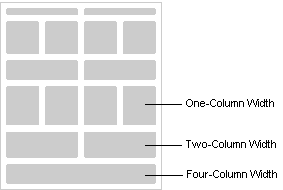
The following figure includes an example of a layout that Siebel CRM creates from the master template. Each X indicates a region that does not contain any mapped control.
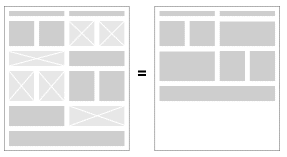
The following figure includes another example of a layout that Siebel CRM creates from the master template.
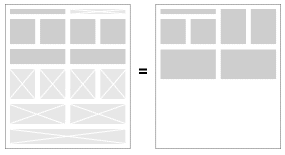
The following figure displays the ID ranges that Siebel CRM uses for the controls that it displays in each region. It is recommended that you configure Siebel CRM to map each control to the lowest ID that is available in each region.
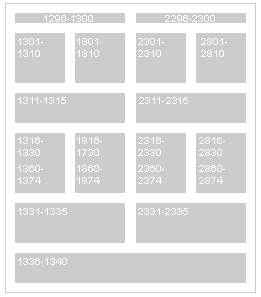
About the Style That Some Four Column Form Templates Use
The following templates create the same layout for a form that includes four columns. They also support child and grandchild styles.
The following figure includes a parent style that these templates display.

The following figure includes a child style that these templates display.

Capabilities of Four Column Form Templates
Form templates that include four columns can do the following:
Define a large number of control placeholders. Some of these placeholders can span one column, two columns, or four columns.
Map fields up to four columns.
Display labels at start of field values.
Display validation errors at the start of the form.
Support text in ID 91 that spans all four columns.
Support the predefined applet styles.
Form Template for Edit, New, or Query Mode
The following figure includes the generic layout that the Applet List Edit (Edit/New/Query) Web template uses. For more information, see About the Style That Some Four Column Form Templates Use.
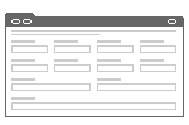
This template uses the following structure:
Applet List Edit (Edit/New/Query)
CCApplet_NamedSpacer
CCTitle_Named
CCTitle
CCFormButtonsTop
CCButtons
CCRecordNav
CCTogglebar_drop
CCFormButtonsTopRight
CCList4ColBody
The following table lists the items that Siebel CRM can map for this template. For more information, see About Mapping IDs to Placeholders.
Table Items Siebel CRM Can Map for the Applet List Edit (Edit/New/Query) Web Template
| ID | Placeholder |
|---|---|
2 |
Back |
91 |
Inside Applet Help Text |
106 |
Query |
107 |
Go (ExecuteQuery) |
108 |
Cancel (Query) |
109 through 111 |
Control |
121 |
First |
122 |
Previous |
123 |
Next |
124 |
Last |
125 |
Info-Button |
131 |
New |
132 |
Edit |
133 |
Delete |
134 |
Reset |
135 |
Cancel |
136 |
Save |
139 through 143 |
Control |
150 through 152 |
Control |
160 through 164 |
Control |
192 |
Label |
194 |
Label |
580 |
New |
599 |
Save |
1001 through 1009 |
FormSection |
1020 |
FormSection |
1296 through 1300 |
Required or Label or 2-Column Wide Field |
1301 through 1310 |
Required or Label |
1311 through 1315 |
Required or Label or 2-Column Wide Field |
1316 through 1330 |
Required or Label or Field |
1331 through 1335 |
Required or Label or 4-Column Wide Field |
1336 through 1340 |
Required or Label or 4-Column Wide Field |
1360 through 1374 |
Required or Label or Field |
1500 |
Required or Legend |
1801 through 1810 |
Required or Label or Field |
1816 through 1830 |
Required or Label or Field |
1860 through 1874 |
Required or Label or Field |
2001 through 2009 |
FormSection |
2296 through 2300 |
Required or Label or 2-Column Wide Field |
2301 through 2310 |
Required or Label or Field |
2311 through 2315 |
Required or Label or 2-Column Wide Field |
2316 through 2330 |
Required or Label or Field |
2331 through 2335 |
Required or Label or 2-Column Wide Field |
2360 through 2374 |
Required or Label or Field |
2801 through 2810 |
Required or Label or Field |
2816 through 2830 |
Required or Label or Field |
2860 through 2874 |
Required or Label or Field |
One Column Form Template
The Applet Form 1-Col (Base/Edit/New) template uses the Applet Form 1 Column (Base/Edit/New) Web template. It also supports the child and grandchild styles.
The following image includes an example of this template.
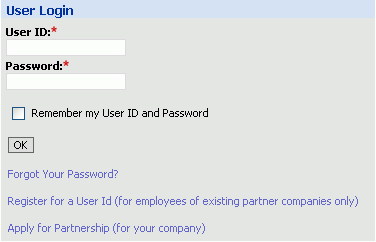
One Column Form, Light Template
The Applet Form 1-Col Light (Base/Edit/New) template uses the Applet Form 1 Column Light (Base/Edit/New) Web template. You can use it on a portal page where you require a light, single-column form.
The following image includes an example of this template.

One Column Form, Light Template for Base, Edit, or New Mode
The Applet Form 1 Column Light (Base/Edit/New) template uses the Applet Form 1 Column Light (Base/Edit/New) Web template. This template does the following:
Supports a required field indicator for each field.
Supports narrow columns, such as the columns that a home page view displays.
Supports parent, child, and grandchild styles.
Displays a label at start of the field value.
Displays buttons at the end of the applet.
Gets the applet title from the Title property of the applet.
The following image includes the generic layout that this template uses.

This template uses the following structure:
AppletForm1ColumnLight (Base/Edit/New)
CCApplet_NamedSpacer
CCTitle_NamedC
CTitle
CCForm1ColBodyLight
dCCFormButtonsBottom
dCCButtons_Form
The following table lists the items that Siebel CRM can map for this template. For more information, see About Mapping IDs to Placeholders.
Table Items Siebel CRM Can Map for the AppletForm1ColumnLight (Base/Edit/New) Web Template
| ID | Placeholder |
|---|---|
2 |
Back |
91 |
Inside Applet Help Text |
106 |
Query |
107 |
Go (ExecuteQuery) |
108 |
Cancel (Query) |
109 through 110 |
Control |
131 |
New |
132 |
Edit |
133 |
Delete |
134 |
Reset |
135 |
Cancel |
136 |
Save |
139 through 143 |
Control |
151 through 155 |
Control |
156 |
Control |
157 through 158 |
Control |
1301 through 1330 |
Required or Label or Field |
1500 |
Required or Legend |
Four Column Form Template for Base Mode
The predefined Applet Form 4 Column (Base) template uses the AppletForm4Column (Base) web template.
The following image includes the generic layout that this template uses. For more information, see About the Style That Some Four Column Form Templates Use.
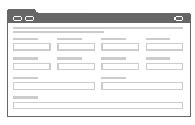
This template uses the following structure:
AppletForm4Col (Base
CCApplet_NamedSpacer
CCTitle_Named
CCTitle
CCFormButtonsTop
CCButtons
CCRecordNav
CCTogglebar_drop
CCFormButtonsTopRight
CCForm4ColBody
The following table lists the items that Siebel CRM can map for this template. For more information, see About Mapping IDs to Placeholders.
Table Items Siebel CRM Can Map for the Applet Form4Column (Base) File Web Template
| ID | Placeholder |
|---|---|
2 |
Back |
91 |
Inside Applet Help Text |
106 |
Query |
107 |
Go (ExecuteQuery) |
108 |
Cancel (Query) |
109 through 111 |
Control |
121 |
First |
122 |
Previous |
123 |
Next |
124 |
Last |
125 |
Info Button |
131 |
New |
132 |
Edit |
133 |
Delete |
134 |
Reset |
135 |
Cancel |
136 |
Save |
139 through 143 |
Control |
150 through 152 |
Control |
160 through 164 |
Control |
192 |
Label |
194 |
Label |
580 |
New |
599 |
Save |
1001 through 1009 |
FormSection |
1020 |
FormSection |
1296 through 1300 |
Required or Label or 2-Column Wide Field |
1301 through 1310 |
Required or Label or Field |
1311 through 1315 |
Required or Label or 2-Column Wide Field |
1316 through 1330 |
Required or Label or Field |
1331 through 1335 |
Required or Label or 2-Column Wide Field |
1336 through 1340 |
Required or Label or 4-Column Wide Field |
1360 through 1374 |
Required or Label or Field |
1500 |
Required or Legend |
1801 through 1810 |
Required or Label or Field |
1816 through 1830 |
Required or Label or Field |
1860 through 1874 |
Required or Label or Field |
2001 through 2009 |
FormSection |
2296 through 2300 |
Required or Label or 2-Column Wide Field |
2301 through 2310 |
Required or Label or Field |
2316 through 2330 |
Required or Label or Field |
2331 through 2335 |
Required or Label or 2-Column Wide Field |
2360 through 2374 |
Required or Label or Field |
2801 through 2810 |
Required or Label or Field |
2811 through 2815 |
Required or Label or 2-Column Wide Field |
2816 through 2830 |
Required or Label or Field |
2860 through 2874 |
Required or Label or Field |
Four Column Form Template for Edit or New Mode
The predefined Applet Form 4 Column (Edit/New) template uses the AppletForm4Col (Edit/New) Web template.
The following image includes the generic layout that this template uses. For more information, see About the Style That Some Four Column Form Templates Use.

This template uses the following structure:
CCAppletForm4Col (Edit/New)
CCApplet_NamedSpacer
CCTitle_Name
CCTitle
CCFormButtonsTop
CCButtons
CCRecordNav
CCTogglebar_drop
CCFormButtonsTopRight
CCForm4ColBody
The following table lists the items that Siebel CRM can map for this template. For more information, see About Mapping IDs to Placeholders.
Table Items Siebel CRM Can Map for the Applet Form4Column (Edit/New) Web Template
| ID | Placeholder |
|---|---|
2 |
Back |
91 |
Inside Applet Help Text |
106 |
Query |
107 |
Go (ExecuteQuery) |
108 |
Cancel (Query) |
109 through 111 |
Control |
121 |
First |
122 |
Previous |
123 |
Next |
124 |
Last |
125 |
Info Button |
131 |
New |
132 |
Edit |
133 |
Delete |
134 |
Reset |
135 |
Cancel |
136 |
Save |
139 through 143 |
Control |
150 through 152 |
Control |
160 through 164 |
Control |
192 |
Label |
194 |
Label |
580 |
New |
599 |
Save |
1001 through 1009 |
FormSection |
1020 |
FormSection |
1296 through 1300 |
Required or Label or 2-Column Wide Field |
1301 through 1310 |
Required or Label or Field |
1311 through 1315 |
Required or Label or 2-Column Wide Field |
1316 through 1330 |
Required or Label or Field |
1331 through 1335 |
Required or Label or 2-Column Wide Field |
1336 through 1340 |
Required or Label or 4-Column Wide Field |
1360 through 1374 |
Required or Label or Field |
1500 |
Required or Legend |
1801 through 1810 |
Required or Label or Field |
1816 through 1830 |
Required or Label or Field |
1860 through 1874 |
Required or Label or Field |
2001 through 2009 |
FormSection |
2296 through 2300 |
Required or Label or 2-Column Wide Field |
2301 through 2310 |
Required or Label or Field |
2316 through 2330 |
Required or Label or Field |
2331 through 2335 |
Required or Label or 2-Column Wide Field |
2360 through 2374 |
Required or Label or Field |
2801 through 2810 |
Required or Label or Field |
2811 through 2815 |
Required or Label or 2-Column Wide Field |
2816 through 2830 |
Required or Label or Field |
2860 through 2874 |
Required or Label or Field |
Grid Layout Form Template
The Applet Form Grid Layout template uses the Applet Form Grid Layout Web template. It uses the following tag as a placeholder for all controls on a form applet. This tag allows you to use the Web Layout Editor in Siebel Tools to modify the layout of the controls:
<div od-type=form-applet-layout>
The following image includes the generic layout that this template uses.
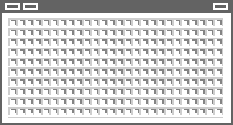
This template uses the following structure:
CCAppletFormGridLayout
CCApplet_NamedSpacer
CCTitle_Named
CCFormButtonsTop
CCButtons
The following table lists the controls that Siebel CRM can map to the header region of the Applet Form Grid Layout template. For more information, see About Mapping IDs to Placeholders.
Table Items That Siebel CRM Can Map for the Applet Form Grid Web Layout
| ID | Placeholder |
|---|---|
2 |
Back |
106 |
Query |
107 |
Go (ExecuteQuery) |
108 |
Cancel (Query) |
109 through 111 |
Control |
121 |
First |
122 |
Previous |
123 |
Next |
124 |
Last |
125 |
Info-Button |
131 |
New |
132 |
Edit |
133 |
Delete |
134 |
Reset |
135 |
Cancel |
136 |
Save |
139 through 143 |
Control |
150 through 152 |
Control |
160 through 164 |
Control |
192 |
Label |
194 |
Label |
580 |
New |
599 |
Save |
1500 |
Required or Legend |
List Templates
This topic describes applet list templates. It includes the following topics:
List Template for Base or Edit List Mode
The Applet List (Base/EditList) template uses the AppletList (Base/EditList) Web template. You can use it for a read-only or editable list. It supports the parent, child, and grandchild styles.
The following image includes the generic layout that this template uses.
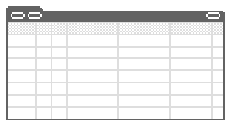
The following image includes an example that uses a single row layout that the user can edit.

This template uses the following structure:
AppletList (Base/EditList)
CCApplet_NamedSpacer
CCTitle_Named
CCTitle
CCListButtonsTop
CCButtons
CCRecordNav
CCTogglebar_drop
CCListButtonsTopRight
CCListHeader
CCListBody
The following table lists the items that Siebel CRM can map for this template. For more information, see About Mapping IDs to Placeholders.
Table Items Siebel CRM Can Map for the AppletList (Base/EditList) Web Template
| ID | Placeholder |
|---|---|
106 |
Query |
107 |
Go (ExecuteQuery) |
108 |
Cancel (Query) |
109 through 111 |
Control |
121 |
First |
122 |
Previous |
123 |
Next |
124 |
Last |
131 |
New |
132 |
Edit |
133 |
Delete |
134 |
Reset |
135 |
Cancel |
136 |
Save |
139 through 143 |
Control |
142 through 143 |
Control |
144 |
Selected Row |
145 |
Control |
146 |
Save |
147 |
Pick Control |
150 through 151 |
Control |
160 through 164 |
Control |
501 through 540 |
Field |
580 |
New |
598 |
Save |
599 |
Save |
611 through 650 |
Field |
1100 |
Outside Applet Help Text |
1500 |
Required or Legend |
Configuring How Siebel CRM Uses the Columns Displayed Feature
A list can typically display between seven and ten visible columns. To make sure all columns are visible, and to avoid unwanted text-wrapping or horizontal scrolling, it is recommended that you do not configure Siebel CRM to map more than ten columns. This template can map up to 80 fields. You typically set the majority of these fields to available but hidden. Siebel CRM does not display hidden fields in the list, by default. It displays them in the Columns Displayed dialog box.
Siebel CRM can set the Columns Displayed menu item of the Menu drop-down list as a shading to indicate that it is not available. If the applet mode is not Edit List, then this menu item is not visible. For more information, see List Template for Base or Edit List Mode.
To display the Columns Displayed menu item, the following objects must be in Edit List mode:
The applet.
The view web template items of the parent view.
Inverted Axis List Template
The Applet List Inverted template uses the AppletListInverted Web template. This is a specialized list applet that creates a comparison list. To display column headers down the first side of the list, Siebel CRM inverts the x-axis and y-axis of this list. It is recommended that you configure this list to display three to five records. The user can use this list to page through larger record sets.
The following image includes the generic layout that this template uses.
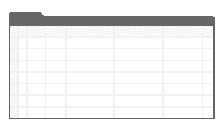
This template uses the following structure:
CCAppletListInverted
CCApplet_NamedSpacer
CCTitle_Named
CCTitle
CCListButtonsTop
CCButtons
CCRecordNav
CCTogglebar_drop
CCListButtonsTopRight
CCListBodyInverted
The following table lists the items that Siebel CRM can map for this template. For more information, see About Mapping IDs to Placeholders.
Table Items Siebel CRM Can Map for the AppletListInverted Web Template
| ID | Placeholder |
|---|---|
106 |
Query |
107 |
Go (ExecuteQuery) |
108 |
Cancel (Query) |
109 through 111 |
Control |
121 |
First |
122 |
Previous |
123 |
Next |
124 |
Last |
131 |
New |
132 |
Edit |
133 |
Delete |
134 |
Reset |
135 |
Cancel |
136 |
Save |
139 through 143 |
Control |
150 through 152 |
Control |
160 through 164 |
Control |
499 |
Record Title Row |
501 through 520 |
Control |
580 |
New |
599 |
Save |
1100 |
Outside Applet Help Text |
1500 |
Required or Legend |
Message List Template
The Applet List Message template uses the AppletListMessage Web template. Siebel CRM uses it on a home page to display news or timely information. Each record displays a bullet and provides a placeholder for a link and short descriptive text. It supports a title that you can map to ID 90 or ID 184 and layout controls.
The following image includes the generic layout that this template uses.
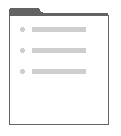
The following image includes an example of this template.
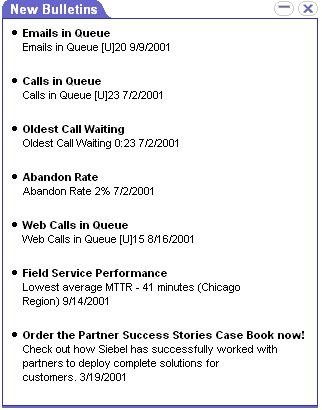
This template uses the following structure:
CCAppletListMessage
CCApplet_Spacer
CCLayoutTitlePortal
CCApplet_Spacer
CCLayoutButtons
CCBottomApplet
CCTitle_Portal
CCLayoutButtons
CCListButtonsTopNoRecNav
CCButtons
CCListButtonsTopRight
CCListBodyBullet
CCBottomApplet
The following table lists the items that Siebel CRM can map for this template. For more information, see About Mapping IDs to Placeholders.
Table Items Siebel CRM Can Map for theAppletListMessage Web Template
| ID | Placeholder |
|---|---|
2 |
Back |
90 |
Title |
106 |
Query |
107 |
Go (ExecuteQuery) |
108 |
Cancel (Query) |
109 through 111 |
Control |
131 |
New |
132 |
Edit |
133 |
Delete |
134 |
Reset |
135 |
Cancel |
136 |
Save |
139 through 143 |
Control |
150 through 151 |
Control |
157 |
Label |
160 through 164 |
Control |
184 |
Drilldown Title |
203 |
MinimizeApplet |
204 |
MaximizeApplet |
207 |
MoveAppletUp |
208 |
MoveAppletDown |
211 |
ShowApplet |
212 |
HideApplet |
501 |
Field |
502 through 511 |
Field |
555 |
Label |
580 |
New |
599 |
Save |
1100 |
Outside Applet Help Text |
Portal List Template
The Applet List Portal template uses the AppletListPortal Web template. Siebel CRM uses it on a portal page. It displays a title, layout controls, and an optional line of buttons beneath the title. It supports a title that you can map to ID 90 or 184.
The following image includes the generic layout that this template uses.
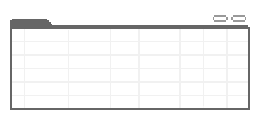
This template uses the following structure:
AppletListPortal
CCApplet_Spacer
CCLayoutTitlePortal
CCApplet_Spacer
CCLayoutButtons
CCBottomApplet
CCTitle_Portal
CCLayoutButtons
CCListButtonsTopNoRecNav
CCButtons
CCListButtonsTopRight
CCListHeaderNoSort
CCListBodyNoRowHilite
CCBottomApplet
The following table lists the items that Siebel CRM can map for this template. For more information, see About Mapping IDs to Placeholders.
Table Items Siebel CRM Can Map for theAppletListPortal Web Template
| ID | Placeholder |
|---|---|
2 |
Back |
90 |
Title |
106 |
Query |
107 |
Go (ExecuteQuery) |
108 |
Cancel (Query) |
109 through 111 |
Control |
131 |
New |
132 |
Edit |
133 |
Delete |
134 |
Reset |
135 |
Cancel |
136 |
Save |
139 through 143 |
Control |
142 through 143 |
Control |
144 |
Selected Row |
145 |
Control |
146 |
Save |
147 |
Pick Control |
150 through 151 |
Control |
157 |
Label |
160 through 164 |
Control |
184 |
Drilldown Title |
203 |
MinimizeApplet |
204 |
MaximizeApplet |
207 |
MoveAppletUp |
208 |
MoveAppletDown |
211 |
ShowApplet |
212 |
HideApplet |
501 through 540 |
Field |
555 |
Label |
580 |
New |
599 |
Save |
1100 |
Outside Applet Help Text |
Portal List Template with Graphics
The Applet List Portal (Graphical) template uses the AppletListPortalGraphical web template. It displays a title, layout controls, and an optional line of buttons beneath the title. This is a specialized list template in that it can display a graphical applet title. You can map the:
Applet image to ID 89.
Applet title to ID 90 or 184.
The following image includes the generic layout that this template uses.
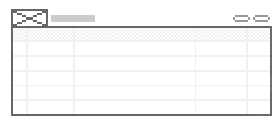
The following image includes an example of this template.
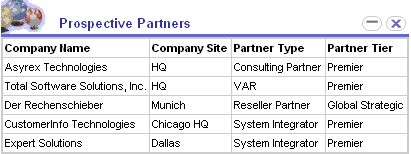
This template uses the following structure:
AppletListPortalGraphical
CCApplet_Spacer
CCLayoutTitlePortal
CCApplet_Spacer
CCLayoutButtons
CCBottomApplet
CCTitle_PortalGraphical
CCLayoutButtons
CCListButtonsTopNoRecNav
CCButtons
CCListButtonsTopRight
CCListHeaderNoSort
CCListBodyNoRowHilite
CCBottomApplet
The following table lists the items that Siebel CRM can map for this template. For more information, see About Mapping IDs to Placeholders.
Table Items Siebel CRM Can Map for the AppletListPortalGraphical Web Template
| ID | Placeholder |
|---|---|
2 |
Back |
89 |
Image |
90 |
Title |
106 |
Query |
107 |
Go (ExecuteQuery) |
108 |
Cancel (Query) |
109 through 111 |
Control |
131 |
New |
132 |
Edit |
133 |
Delete |
134 |
Reset |
135 |
Cancel |
136 |
Save |
139 through 143 |
Control |
142 through 143 |
Control |
144 |
Selected Row |
145 |
Control |
146 |
Save |
147 |
Pick Control |
150 through 151 |
Control |
157 |
Label |
160 through 164 |
Control |
184 |
Drilldown Title |
203 |
MinimizeApplet |
204 |
MaximizeApplet |
207 |
MoveAppletUp |
208 |
MoveAppletDown |
211 |
ShowApplet |
212 |
HideApplet |
501 through 540 |
Field |
555 |
Label |
580 |
New |
599 |
Save |
1100 |
Outside Applet Help Text |
Totals List Template for Base or Edit List Mode
The Applet List Totals (Base/EditList) template uses the AppletListTotals (Base/EditList) web template. You can map up to 40 fields in this template. For more information about configuring these fields, see Configuring How Siebel CRM Uses the Columns Displayed Feature.
This template supports the parent, child, and grandchild styles.
The following image includes the generic layout that this template uses.
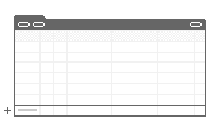
The following image illustrates how you can use this template for a read-only or editable list that displays column totals in the last row. You must make sure you apply a Totals label to the placeholder in the first column.

This template uses the following structure:
AppletListTotals (Base/EditList)
CCApplet_NamedSpacer
CCTitle_Named
CCTitle
CCListButtonsTop
CCButtons
CCRecordNav
CCTogglebar_drop
CCListButtonsTopRight
CCListHeaderTotals
CCListBodyTotals
The following table lists the items that Siebel CRM can map for this template. For more information, see About Mapping IDs to Placeholders.
Table Items Siebel CRM Can Map for the AppletListTotals (Base/EeditList) Web Template
| ID | Placeholder |
|---|---|
106 |
Query |
107 |
Go (ExecuteQuery) |
108 |
Cancel (Query) |
109 through 111 |
Control |
121 |
First |
122 |
Previous |
123 |
Next |
124 |
Last |
131 |
New |
132 |
Edit |
133 |
Delete |
134 |
Reset |
135 |
Cancel |
136 |
Save |
139 through 143 |
Control |
142 through 143 |
Control |
144 |
Selected Row |
145 |
Control |
146 |
Save |
147 |
Pick Control |
150 through 151 |
Control |
160 through 164 |
Control |
199 |
Totals Label |
501 through 540 |
Control |
580 |
New |
599 |
Save |
611 through 650 |
Control |
1100 |
Outside Applet Help Text |
1500 |
Required or Legend |
Calendar Templates
This topic describes calendar templates. It includes the following topics:
Daily Calendar Template
The eCalendar Daily Applet template uses the eCalendarDailyApplet web template. It supports the parent, child, and grandchild applet styles.
The following image includes the generic layout that this template uses.
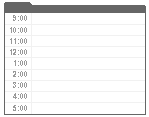
The following image includes an example of this template that uses the parent style.

This template uses the following structure:
eCalendarDailyApplet CCApplet_NamedSpacer CCTitle_Named CCBottomApplet
The following table lists the items that Siebel CRM can map for this template. For more information, see About Mapping IDs to Placeholders.
Table Items Siebel CRM Can Map for the eCalendarDailyApplet Web Template
| ID | Placeholder |
|---|---|
101 |
Owner Label |
102 |
Owner Field |
103 |
Date Label |
104 |
Date Field (Day) |
105 |
Date Field (Month) |
106 |
Date Field (Year) |
107 |
Time Zone Label |
108 |
Time Zone Field |
130 |
Go |
131 |
Previous |
132 |
Next |
133 |
New Appt |
996 |
Owner Selector |
997 |
Owner Field 2 |
998 |
Today |
10000 through 10002 |
Optional Control |
20000 through 20002 |
Optional Control |
Daily Calendar Template for Portals
The Applet Calendar Daily (Portal) template uses the AppletCalendarDaily (Portal) web template. It displays a condensed calendar that you can use on a home page. It supports a graphical header that you can map to ID 89.
The following image includes the generic layout that this template uses.
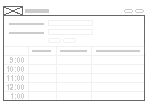
This template uses the following structure:
AppletCalendarDaily (Portal)
CCLayoutTitlePortal
CCLayoutButtons
CCBottomApplet
CCCalendarAppletTitleGraphical
CCLayoutButtons
The following table lists the items that Siebel CRM can map for this template. For more information, see About Mapping IDs to Placeholders.
Table Items Siebel CRM Can Map for the AppletCalendarDaily (Portal) Web Template
| ID | Placeholder |
|---|---|
89 |
Image |
90 |
Title |
101 |
Owner Label |
102 |
Owner Field |
103 |
Date Label |
104 |
Date Field (Month) |
105 |
Date Field (Day) |
106 |
Date Field (Year) |
107 |
TimeZoneLabel |
108 |
TimeZone |
130 |
Go |
131 |
Previous |
132 |
Next |
133 |
New Appt |
157 |
Label |
158 |
GoToWeeklyView |
159 |
GoToMonthlyView |
184 |
DrillDown Title |
203 |
MinimizeApplet |
204 |
MaximizeApplet |
207 |
MoveAppletUp |
208 |
MoveAppletDown |
211 |
ShowApplet |
212 |
HideApplet |
555 |
Label |
999 |
GoToToday |
Weekly Calendar Template
The eCalendar Weekly Applet template uses the eCalendarWeeklyApplet web template. It displays days of the week down the side of the applet. It embeds daily activities next to each day. This template supports the predefined applet styles. You must map the applet title to ID 90.
The following image includes the generic layout that this template uses.
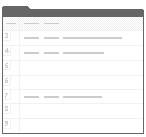
The following image includes an example of this template.

This template uses the following structure:
eCalendarWeeklyApplet CCApplet_NamedSpacer CCTitle_Named CCBottomApplet
The following image lists the items that Siebel CRM can map for this template. For more information, see About Mapping IDs to Placeholders.
Table Items Siebel CRM Can Map for the eCalendarWeeklyApplet Web Template
| ID | Placeholder |
|---|---|
101 |
Owner Label |
102 |
Owner Field |
103 |
Date Label |
104 |
Date Field (Day) |
105 |
Date Field (Month) |
106 |
Date Field (Year) |
107 |
Time Zone Label |
108 |
Time Zone Field |
130 |
Go |
131 |
Previous |
132 |
Next |
133 |
New Appt |
141 |
New Appt Bitmap |
142 |
Repeat Bitmap |
145 |
|
301 |
Start Time |
302 |
End Time |
303 |
Description |
996 |
Owner Selector |
997 |
Owner Field 2 |
998 |
Today |
10000 through 10002 |
Optional Control |
20000 through 20002 |
Optional Control |
Monthly Calendar Template
The eCalendar Monthly Applet template uses the eCalendarMonthlyApplet web template. It supports the predefined applet styles. You must map the applet title to ID 90.
The following image includes the generic layout that this template uses.

The following table includes an example of this template.

This template uses the following structure:
eCalendarMonthlyApplet CCApplet_NamedSpacer CCTitle_Named CCCalendarMonthly_weekday CCCalendarMonthly_weekend CCBottomApplet
The following table lists the items that Siebel CRM can map for this template. For more information, see About Mapping IDs to Placeholders.
Table Items Siebel CRM Can Map for the eCalendarMonthlyApplet Web Template
| ID | Placeholder |
|---|---|
101 |
Owner Label |
102 |
Owner Field |
103 |
Date Label |
104 |
Date Field (Day) |
105 |
Date Field (Month) |
106 |
Date Field (Year) |
107 |
Time Zone Label |
108 |
Time Zone Field |
130 |
Go |
131 |
Previous |
132 |
Next |
133 |
New Appt |
145 |
|
301 through 305 |
Weekday labels for Monday through Friday. |
306 |
Sat/Sun Label |
996 |
Owner Selector |
997 |
Owner Field 2 |
998 |
Today |
Service Calendar Template
The Service Calendar Applet template uses the ServiceCalendarApplet web template. It supports the predefined applet styles. IDs 301 through 307 map the days of the week that display as column headers.
The following image includes the generic layout that this template uses.

This template uses the following structure:
ServiceCalendarApplet CCApplet_NamedSpacer CCTitle_Named CCBottomApplet
The following table lists the items that Siebel CRM can map for this template. For more information, see About Mapping IDs to Placeholders.
Table Items Siebel CRM Can Map for the ServiceCalendarApplet Web Template
| ID | Placeholder |
|---|---|
301 through 307 |
Day labels for Sunday through Saturday. |
Chart Templates
This topic describes chart templates. It includes the following topics:
Chart Template
The Applet Chart template uses the AppletChart web template. It supports the parent, child, and grandchild styles. You can map chart controls to ID ranges 501 through 520 and 551 through 555. You map the chart to ID 599.
This template can work with a toggle applet relationship. Siebel CRM displays the other toggle applets in a drop-down list. It maps the drop-down label to ID 2.
The following image includes the generic layout that this template uses.
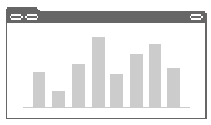
The following image includes an example of this template that uses the child style.

This template uses the following structure:
AppletChart
CCApplet_NamedSpacer
CCTitle_Named
CCChartBasic
CCTogglebar_drop2
The following table lists the items that Siebel CRM can map for this template. For more information, see About Mapping IDs to Placeholders.
Table Items Siebel CRM Can Map for the AppletChart Web Template
| ID | Placeholder |
|---|---|
501 through 520 |
Control |
551 through 555 |
Control |
599 |
Chart |
1500 |
Required or Legend |
Gantt Chart Template
The eGantt Chart Applet template uses the GanttChartApplet web template. It supports the parent, child, and grandchild styles. It supports relocating objects starting with Internet Explorer 5. It supports optional controls that you can map to IDs 306 through 314.
Other Gantt chart templates use the eGantt Chart Applet template.
The following image includes an example of this template.

This template uses the following structure:
GanttChartApplet CCGanttAppletTitle CCBottomApplet
The following table lists the items that Siebel CRM can map for this template. For more information, see About Mapping IDs to Placeholders.
Table Items Siebel CRM Can Map for the GanttChartApplet Web Template
| ID | Placeholder |
|---|---|
301 through 302 |
Employee Header |
303 |
Previous |
304 |
Next |
306 through 314 |
Label or Control |
405 |
Control |
2101 through 2130 |
Control |
Gantt Chart Activity Template
The eActivityGanttChart Applet template uses the eActivityGanttChartApplet web template. It includes specialized Gantt code that prevents Siebel CRM from using it outside the context of a Gantt applet.
This template uses the following structure:
eActivityGanttChartApplet CCApplet_NamedSpacer CCGanttAppletTitle CCBottomApplet
The following information lists the items that Siebel CRM can map for this template. For more information, see About Mapping IDs to Placeholders.
Table Items Siebel CRM Can Map for the eActivityGanttChartApplet Web Template
| ID | Placeholder |
|---|---|
301 through 302 |
Employee Header |
303 |
Previous |
304 |
Next |
306 through 314 |
Label or Control |
405 |
Control |
2101 through 2130 |
Control |
Gantt Chart Template for Portals
The eGanttChart Applet (Portal) template uses the eGanttChartApplet (Portal) web template. It supports a title that can map to a drilldown. You can use it to map layout controls on a portal page. You can use IDs 203 through 212 to map these controls.
This template uses the following structure:
eGanttChartApplet (Portal)
CCLayoutTitlePortal
CCApplet_Spacer
CCLayoutButtons
CCBottomApplet
CCApplet_Spacer
CCTitle_Portal
CCLayoutButtons
CCBottomApplet
The following information lists the items that Siebel CRM can map for this template. For more information, see About Mapping IDs to Placeholders.
Table Items Siebel CRM Can Map for the eGanttChartApplet (Portal) Web Template
| ID | Placeholder |
|---|---|
90 |
Title |
157 |
Label |
184 |
DrillDown Title |
203 |
MinimizeApplet |
204 |
MaximizeApplet |
207 |
MoveAppletUp |
208 |
MoveAppletDown |
211 |
ShowApplet |
212 |
HideApplet |
301 through 302 |
Employee Header |
303 |
Previous |
304 |
Next |
306 through 314 |
Label or Control |
405 |
Control |
555 |
Label |
2101 through 2130 |
Control |
Container Templates
This topic describes page container templates. It includes the following topics:
Container Template
The Page Container template uses the PageContainer web template. It defines the setup for frames. An employee application requires frames. The employee container templates create frames for the banner, screen bar, view bar, and content. Some employee applications might also use frames for a toolbar, a message bar, the search center, the persistent customer dashboard, and the iHelp pane. To display an optional frame, Siebel CRM calls a predefined UI method at run time.
This template uses the following structure:
PageContainer
CCStylesChoice
CCFrameBanner
CCFrameViewbar
CCStylesChoice
CCFrameToolbar
CCStylesChoice
CCFrameThreadbar
CCStylesChoice
CCThreadbar
CCFrameScreenbar
CCStylesChoice
CCScreenbar_Tabs
CCFrameMsgbar
CCStylesChoice
The following information lists the items that Siebel CRM can map for this template. For more information, see About Mapping IDs to Placeholders.
Table Items Siebel CRM Can Map for the PageContainer Web Template
| ID | Placeholder |
|---|---|
1 |
Show Label |
21 through 22 |
Page Item |
23 |
Page Item (History Label) |
33 through 34 |
Control |
35 |
Favorites Label |
36 through 38 |
Control |
CC Container Page Logic Template
The CC Container Page Logic template uses the CCContainerPageLogic web template. It examines preferences and sends the logical frameset.
This template uses the following structure:
CCContainerPageLogic CCFrameContent_VSDT CCFrameContent_VSD CCFrameContent_VST CCFrameContent_VS CCFrameContent_VDT CCFrameContent_VD CCFrameContent_VT CCFrameContent_V
Popup Templates
This topic describes popup templates. It includes the following topics:
Popup Form Template
The Popup Form template uses the AppletPopupForm web template. It defines a one column form that Siebel CRM uses in base or edit pop-up mode.
The following image includes the generic layout that this template uses.

This template uses the following structure:
AppletPopupForm CCStylesChoice CCButtons CCButtons_Popup
The following table lists the items that Siebel CRM can map for this template. For more information, see About Mapping IDs to Placeholders.
Table Items Siebel CRM Can Map for the AppletPopupForm Web Template
| ID | Placeholder |
|---|---|
2 |
Back |
91 |
Inside Applet Help Text |
106 |
Query |
107 |
Go (ExecuteQuery) |
108 |
Cancel (Query) |
109 through 111 |
Control |
131 |
New |
132 |
Edit |
133 |
Delete |
134 |
Reset |
135 |
Cancel |
136 |
Save |
139 through 143 |
Control |
152 |
OK |
153 |
Cancel |
154 through 158 |
Control |
580 |
New |
599 |
Save |
1001 through 1009 |
FormSection |
1090 through 1099 |
Required or Label or Field |
1100 |
Label With Rule |
1101 through 1110 |
Required or Label or Field |
1111 through 1115 |
Required or Label or Field |
1150 |
Label With Rule |
1151 through 1160 |
Required or Label or Field |
1500 |
Required or Legend |
2001 through 2002 |
FormSection |
2101 through 2110 |
Required or Label or Field |
2111 through 2115 |
Required or Label or Field |
Popup Form, Grid Layout Template
The Applet Popup Form Grid Layout template uses the AppletPopupFormGridLayout web template. It uses the following tag as a placeholder for all controls in a popup form applet that Siebel CRM displays in a grid:
<div od-type=form-applet-layout>
The following image includes the generic layout that this template uses.
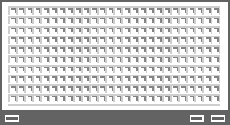
This template uses the following structure:
AppletPopupFormGridLayout CCApplet_NamedSpacer CCButtons CCButtons_Popup
The following table lists the items that Siebel CRM can map for this template to the footer of the Applet Popup Form Grid Layout template. For more information, see About Mapping IDs to Placeholders.
Table Items That Siebel CRM Can Map for the AppletPopupFormGridLayout Web Template
| ID | Placeholder |
|---|---|
2 |
Back |
91 |
Inside Applet Help Text |
106 |
Query |
107 |
Go (ExecuteQuery) |
108 |
Cancel (Query) |
109 through 111 |
Control |
131 |
New |
132 |
Edit |
133 |
Delete |
134 |
Reset |
135 |
Cancel |
136 |
Save |
139 through 143 |
Control |
152 |
OK |
153 |
Cancel |
154 through 158 |
Control |
580 |
New |
599 |
Save |
Popup List Template
The Popup List template uses the PopupList web template. It defines how Siebel CRM displays a list in Base or Edit List pop-up mode.
The following image includes the generic layout that this template uses.

The following image includes an example of this template.

This template uses the following structure:
PopupList
CCListButtonsTop
CCButtons
CCRecordNav
CCTogglebar_drop
CCListButtonsTopRight
CCListHeader
CCListBody
CCButtons_Popup
The following image lists the items that Siebel CRM can map for this template. For more information, see About Mapping IDs to Placeholders.
Table Items Siebel CRM Can Map for the PopupList Web Template
| ID | Placeholder |
|---|---|
2 |
Back |
106 |
Query |
107 |
Go (ExecuteQuery) |
108 |
Cancel (Query) |
109 through 111 |
Control |
121 |
First |
122 |
Previous |
123 |
Next |
124 |
Last |
131 |
New |
132 |
Edit |
133 |
Delete |
134 |
Reset |
135 |
Cancel |
136 |
Save |
139 through 143 |
Control |
144 |
Selected Row |
145 |
Control |
146 |
Save (Optional) |
147 |
Pick |
150 through 151 |
Control |
152 |
OK |
153 |
Cancel |
154 through 158 |
Control |
160 through 164 |
Control |
501 through 540 |
Field |
580 |
New |
599 |
Save |
611 through 650 |
Control |
Popup Spell Checker Template
The Spell Checker Popup Applet template uses the AppletSpellCheck web template. It is a specialized salutation applet that creates the spell check pop-up list.
This template uses the following structure:
CCAppletSpellCheck
The following information lists the items that Siebel CRM can map for this template. For more information, see About Mapping IDs to Placeholders.
Table Items Siebel CRM Can Map for the AppletSpellCheck Web Template
| ID | Placeholder |
|---|---|
91 |
Inside Applet Help Text |
132 through 133 |
Control |
134 |
Div |
135 through 136 |
Control |
137 |
Div |
138 through 139 |
Control |
140 |
Div |
141 through 142 |
Control |
143 |
Div |
144 through 145 |
Control |
146 |
Div |
152 through 153 |
Control |
154 |
Div |
155 |
Control |
156 |
Control |
1201 |
Replacement Word Label |
1211 |
Suggested Word Label |
1221 |
Dictionary Label |
1300 |
Text Segment |
Popup Query Template
The Popup Query template uses the PopupQuery web template. The following image includes an example of this template.
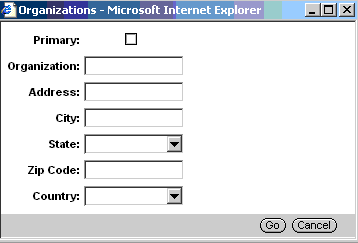
Search Templates
This topic describes search templates. It includes the following topics:
Search Center, Top Template
The Applet Form Search Top template uses the AppletFormSearchTop web template. It defines a specialized applet that Siebel CRM uses to display the first part of the Search Center. You can map the Search Center title only to ID 90. You can map the control that hides the Search Center frame only to ID 141.
This template uses the following structure:
AppletFormSearchTop CCFormSearch
The following information lists the items that Siebel CRM can map for this template. For more information, see About Mapping IDs to Placeholders.
Table Items Siebel CRM Can Map for theAppletFormSearchTop Web Template
| ID | Placeholder |
|---|---|
91 |
Inside Applet Help Text |
141 |
Hide Icon. |
1201 through 1230 |
Label |
1301 through 1330 |
Field |
Search Center, Bottom Template
The Search Applet template uses the AppletSearchBasic web template. It defines a specialized applet that Siebel CRM uses to display the ending part of the Search Center.
The following image includes the Search Center.

This template uses the following structure:
AppletSearchBasic CCFormSearch
The following table lists the items that Siebel CRM can map for this template. For more information, see About Mapping IDs to Placeholders.
Table Items Siebel CRM Can Map for the AppletSearchBasic Web Template
| ID | Placeholder |
|---|---|
91 |
Inside Applet Help Text |
132 |
Menu |
133 |
New |
141 through 142 |
Control |
143 |
Control |
1101 through 1130 |
Label or Field |
Advanced Search Template
The Advanced Search template uses the AppletSearchAdvanced web template. It defines a specialized applet that displays advanced search.
This template uses the following structure:
AdvancedSearch
The following image includes the Advanced Search applet.

The following table lists the items that Siebel CRM can map for this template. For more information, see About Mapping IDs to Placeholders.
Table Items Siebel CRM Can Map for the AppletSearchAdvanced Web Template
| ID | Placeholder |
|---|---|
100 |
Label |
105 |
ClearAll |
115 |
Go |
120 |
Label |
125 |
Label |
130 |
Control |
135 |
Field |
145 |
Label |
150 |
Control |
155 |
Label |
160 |
HTML Checkbox |
165 |
Label |
170 |
Field |
175 |
Label |
180 |
Field |
185 |
Label |
190 |
HTML Checkbox |
195 |
Label |
200 |
HTML Checkbox |
Find Template
The Applet Find template uses the AppletFind web template. It defines a specialized applet that determines the ending of the search applet. The last section of the Search Center displays the fields that the user can choose to do an applet query.
This template uses the following structure:
AppletFind CCFormSearch
The following information lists the items that Siebel CRM can map for this template. For more information, see About Mapping IDs to Placeholders.
Table Items Siebel CRM Can Map for the AppletFind Web Template
| ID | Placeholder |
|---|---|
91 |
Inside Applet Help Text |
132 |
Menu |
133 |
New |
141 through 142 |
Control |
143 |
Control |
1101 through 1130 |
Label or Field |
Save Search Template
The Save Search template uses the SearchResultsSaveSearch web template. It defines a specialized applet that displays searches that the user saves.
The following image includes the Save Search applet.

This template uses the following structure:
SearchResultsSaveSearch
The following table lists the items that Siebel CRM can map for this template. For more information, see About Mapping IDs to Placeholders.
Table Items That Siebel CRM Can Map for the SearchResultsSaveSearch Web Template
| ID | Placeholder |
|---|---|
1000 |
Label |
1005 |
Field |
1010 |
Label |
1015 |
Field |
1020 |
Control |
1025 |
Control |
Search Preference Template
The Search Preference template uses the SearchPreference web template. It sets search preferences.
The following image includes the Search Preference applet.
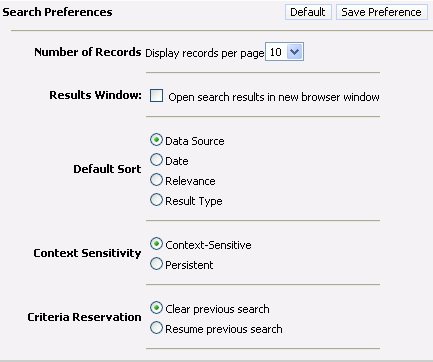
This template uses the following structure:
SearchPreference
The following table lists the items that Siebel CRM can map for this template. For more information, see About Mapping IDs to Placeholders.
Table Items That Siebel CRM Can Map for the SearchPreference Web Template
| ID | Placeholder |
|---|---|
1000 |
Search Preferences (Label) |
1001 |
Default |
1002 |
Save Preference |
1003 |
Number of Records (Label) |
1004 |
Display records per page (Label) |
1005 |
Select drop-down menu |
1006 |
Results Window (Label) |
1007 |
HTML Checkbox |
1008 |
Open search results in new browser window (Label) |
1009 |
Default Sort (Label) |
1010 |
HTML RadioButton |
1018 |
Context Sensitivity (Label) |
1019 |
HTML RadioButton |
1020 |
Criteria Reservation (Label) |
1021 |
HTML RadioButton |
Search Results Templates
The Search Results Header, Search Results Body, and Search Refine Category applets are specialized applets that display search results. The following image includes an example of these applets.

Search Results Header
The Search Results Header applet uses the SearchHeaderResults web template. It includes a summary of search results.
This template uses the following structure:
SearchHeaderResults
The following information lists the items that Siebel CRM can map for this template. For more information, see About Mapping IDs to Placeholders.
Table Items That Siebel CRM Can Map for the SearchHeaderResults Web Template
| ID | Placeholder |
|---|---|
2001 |
Label |
2002 |
Field |
2003 |
Label |
2004 |
Field |
2005 |
Label |
2006 |
Field |
2007 |
Field |
2008 |
Field |
2009 |
Field |
2010 |
Label |
2011 |
Label |
2012 |
Label |
Search Results Body
The Search Results Body applet uses the SearchResults web template. It displays search result details.
This template uses the following structure:
SearchResults Search_ListHeader Search_ListBodySearchResults SearchResultsFooter
The following information lists the items that Siebel CRM can map for this template. For more information, see About Mapping IDs to Placeholders.
Table Items That Siebel CRM Can Map for the SearchResults Web Template
| ID | Placeholder |
|---|---|
151 |
Label |
152 |
Field |
153 |
Field |
502 |
ListHeader |
503 |
ListHeader |
504 |
ListHeader |
2010 |
Label |
3000 |
Label |
Search Refine Category
The Search Refine Category applet uses the Search_RefineCategoryApplet web template. It allows the user to refine a search.
This template uses the following structure:
Search_RefineCategoryApplet
The following information lists the items that Siebel CRM can map for this template. For more information, see About Mapping IDs to Placeholders.
Table Items That Siebel CRM Can Map for the Search_RefineCategoryApplet Web Template
| ID | Placeholder |
|---|---|
1000 |
Label |
1005 |
Hide Icon |
1010 |
Label |
1015 |
Hide Icon |
Search Results List Template
The Applet List Search Results template uses the AppletListSearchResults web template. It defines the search results list that Siebel CRM displays in the Search Center pane. To conserve vertical space, it embeds the applet title in the button bar after the menu button.
The following image includes the generic layout that this template uses.
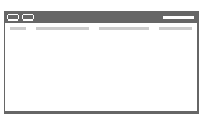
This template uses the following structure:
AppletListSearchResults CCButtons CCRecordNav CCListHeader CCListBodySearchResults
The following table lists the items that Siebel CRM can map for this template. For more information, see About Mapping IDs to Placeholders.
Table Items Siebel CRM Can Map for the AppletListSearchResults Web Template
| ID | Placeholder |
|---|---|
2 |
Back |
106 |
Query |
107 |
Go (ExecuteQuery) |
108 |
Cancel (Query) |
109 through 111 |
Control |
121 |
First |
122 |
Previous |
123 |
Next |
124 |
Last |
131 |
New |
132 |
Edit |
133 |
Delete |
134 |
Reset |
135 |
Cancel |
136 |
Save |
139 through 143 |
Control |
142 through 143 |
Control |
144 |
Select |
145 |
Control |
146 |
Control |
147 |
Pick |
501 through 540 |
Control |
580 |
New |
599 |
Save |
611 through 640 |
Control |
Search Results View Template
The Search Results View template uses the SearchResultsView web template. It a specialized view template that Siebel CRM uses to display search results.
Search Results Templates includes an example of this template.
This template uses the following structure:
SearchResultsView
CCStylesChoice
The following tab;e lists the items that Siebel CRM can map for this template. For more information, see About Mapping IDs to Placeholders.
Table Items Siebel CRM Can Map for the SearchResultsView Web Template
| ID | Placeholder |
|---|---|
1 through 3 |
Applet |
Tree Templates
This topic describes tree templates. It includes the following topics:
Applet Tree Template
The AppletTree2 template uses the AppletTree2 web template. It determines applet tabs and borders.
The following image includes the generic layout that this template uses.

This template uses the following structure:
AppletTree2
CCApplet_NamedSpacer
CCTitle_Named
CCTitle
CCListButtonsTopNoRecNav
CCButtonsCCListButtonsTopRight
The following table lists the items that Siebel CRM can map for this template. For more information, see About Mapping IDs to Placeholders.
Table Items Siebel CRM Can Map for the AppletTree2 Web Template
| ID | Placeholder |
|---|---|
2 |
Back |
106 |
Query |
107 |
Go (ExecuteQuery) |
108 |
Cancel (Query) |
109 through 111 |
Control |
131 |
New |
132 |
Edit |
133 |
Delete |
134 |
Reset |
135 |
Cancel |
136 |
Save |
139 through 143 |
Control |
150 |
Control |
151 |
Control |
160 through 164 |
Control |
580 |
New |
599 |
Save |
1100 |
Outside Applet Help Text |
1500 |
Required or Legend |
Applet Tree, Marketing Template
The Applet Tree Marketing template uses the AppletTreeMarketing web template. It is a specialized tree applet that determines tabs and borders. It supports a toggle bar.
The following image includes the generic layout that this template uses.

This template uses the following structure:
AppletTreeMarketing CCTitle
The following table lists the items that Siebel CRM can map for this template. For more information, see About Mapping IDs to Placeholders.
Table Items Siebel CRM Can Map for the AppletTreeMarketing Web Template
| ID | Placeholder |
|---|---|
101 |
Label |
102 |
Control |
132 |
Control |
133 |
Control |
142 through 143 |
Control |
201 |
Field |
1500 |
Required or Legend |
View Tree Template
The View Tree template uses the ViewTree web template. It supports multiple columns:
The first column uses 25 percent of the window width and contains a tree applet.
The second column uses 75 percent of the window width and contains a list applet.
It can use noncontext views as tabs.
The following image includes the generic layout that this template uses.
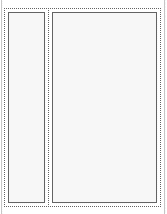
This template uses the following structure:
ViewTree
CCHTMLHeader
CCStylesChoice
CCThreadbar
CCViewbarAll_Tabs_DropList
CCHTMLFooter
The following table lists the items that Siebel CRM can map for this template. For more information, see About Mapping IDs to Placeholders.
Table Items Siebel CRM Can Map for the ViewTree Web Template
| ID | Placeholder |
|---|---|
1 |
Parent Applet |
2 |
Top (Parent) Applet |
3 |
Parent Applet |
4 |
Bottom (Child) Applet |
6 |
Child or Grandchild Applet |
8 |
Child or Grandchild Applet |
10 |
Child or Grandchild Applet |
201 |
Mini-Applet |
View Tree Two Template
The View Tree 2 template uses the ViewTree2 web template. It supports the following columns:
The first column uses 25 percent of the window width and contains a tree applet.
The second column uses 75 percent of the window width and contains a list applet.
It can display noncontext views as tabs.
The following image includes the generic layout that this template uses.
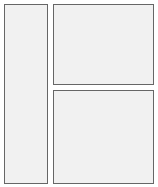
This template uses the following structure:
ViewTree2
CCHTMLHeader
CCStylesChoice
CCThreadbar
CCHTMLFooter
The following table lists the items that Siebel CRM can map for this template. For more information, see About Mapping IDs to Placeholders.
Table Items Siebel CRM Can Map for the ViewTree2 Web Template
| ID | Placeholder |
|---|---|
1 |
Applet |
3 |
Applet |
201 |
Mini-Applet |
View Templates
This topic describes view templates. It includes the following topics:
Overview of Using View Templates
Each shaded area in the view diagrams in View Templates represents an area where you can place one or more applets. Siebel CRM expands each applet horizontally to fit the column where you place this applet. The amount of data that it displays determines the amount of vertical space the applet uses.
Siebel Tools does not determine style. It might display color schemes and applet titles differently than Siebel CRM displays them in the client.
Guidelines for Using View Templates
If you configure a view template, then use the following guidelines:
Map a tree applet map on a view other than the view tree. Siebel CRM does not call a tree applet in a template and the applet that this tree references the same way it calls a predefined applet. You cannot map one of these tree applet as a predefined applet. You can use the View Tree or View Tree 2 applet.
Increase the number of applets that Siebel CRM displays in a region. To define the number of applets that Siebel CRM can map to a region, most regions use a
<div od-iterator=loopIterator>. To increase the boundary index of theloopIterator, you can set the start and end index values such as [0:4] meaning start index of 0 and end index of 4.Use a subframe view. The View 25 – 75 (Framed) template is a subframe view. It displays some applets in the first frame and other applets in the second frame.
Reuse applets. Each applet placeholder that resides in a view template specifies a style. To determine the color scheme that the applet displays and the applet title visibility, Siebel CRM evaluates this style at run time.
To reuse one applet object definition in many situations, you can apply styles in the view template, and then code the applet template so that it evaluates styles. This configuration reuses code and reduces the number of applet copies that you must maintain.
View templates support parent, child, and grandchild styles.
View 1 Over 2 Over 1 Template
The View 1 Over 2 Over 1 template uses the View_1Over2Over1 web template. It includes multiple regions:
The first region uses the full window width.
The second and third regions each use 50 percent of the window width.
The last region uses the full window width.
The following image includes the generic layout that this template uses.
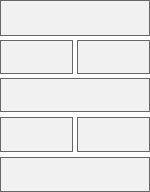
This template uses the following structure:
View_1Over2Over1
CCHTMLHeader
CCStylesChoice
CCThreadbar
CCHTMLFooter
The following table lists the items that Siebel CRM can map for this template. For more information, see About Mapping IDs to Placeholders.
Table Items Siebel CRM Can Map for the View_1Over2Over1 Web Template
| ID | Placeholder |
|---|---|
101 |
Salutation Applet |
102 through 106 |
Applet |
201 |
Mini-Applet |
202 through 206 |
Applet |
302 through 306 |
Applet |
402 through 406 |
Applet |
502 through 506 |
Applet |
602 through 606 |
Applet |
View – 25 – 50 – 25 Template
The View 25 - 50 – 25 template uses the View_25_50_25 web template. It includes the following columns:
The first column uses 25 percent of the window width.
The second column uses 50 percent of the window width.
The third column uses 25 percent of the window width.
The following image includes the generic layout that this template uses.
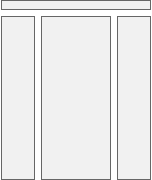
This template uses the following structure:
View_25_50_25
CCHTMLHeader
CCStylesChoice
CCThreadbar
CCHTMLFooter
The following table lists the items that Siebel CRM can map for this template. For more information, see About Mapping IDs to Placeholders.
Table Items Siebel CRM Can Map for the View_25_50_25 Web Template
| ID | Placeholder |
|---|---|
101 |
Salutation Applet |
102 through 111 |
Applet |
201 |
Mini-Applet |
202 through 211 |
Applet |
302 through 311 |
Applet |
View 25 – 75 Template
The View 25 – 75 template uses the View_25_75 web template. It includes the following columns:
The first column uses 25 percent of the window width.
The second column uses 75 percent of the window width.
The following image includes the generic layout that this template uses.
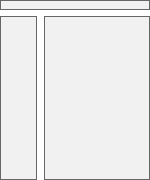
This template uses the following structure:
View_25_75
CCHTMLHeader
CCStylesChoice
CCThreadbar
CCHTMLFooter
The following table lists the items that Siebel CRM can map for this template. For more information, see About Mapping IDs to Placeholders.
Table Items Siebel CRM Can Map for the View_25_75 Web Template
| ID | Placeholder |
|---|---|
101 |
Salutation Applet |
102 through 106 |
Applet |
108 through 112 |
Applet |
201 |
Mini-Applet |
202 through 211 |
Applet |
View 25 – 75 Framed Template
The View 25 – 75 Framed template uses the Smart Script Player And Tree View web template. It includes the following columns:
The first column uses 25 percent of the window width.
The second column uses 75 percent of the window width.
The first and second columns reside in separate frames.
The following includes the generic layout that this template uses.
Table Generic Layout of the View 25 - 75 (Framed) Template
This template uses the following structure:
Smart Script Player And Tree View
CCHTMLHeader
CCStylesChoice
CCThreadbar
CCHTMLFooter
The following table lists the items that Siebel CRM can map for this template. For more information, see About Mapping IDs to Placeholders.
Table Items Siebel CRM Can Map for the Smart Script Player And Tree View Web Template
| ID | Placeholder |
|---|---|
101 |
Salutation Applet |
102 through 106 |
Applet |
108 through 112 |
Applet |
201 |
Mini-Applet |
202 through 211 |
Applet |
View 25 – 75 Framed Two Template
The View 25 75 Framed 2 template uses the View_25_75_Framed2 web template. It includes the following columns:
The first column uses 25 percent of the window width.
The second column uses 75 percent of the window width.
The first column includes two frames. One applet can reside in each frame. The second column is in a single frame.
The following table includes the generic layout that this template uses.
Table Generic Layout of the View_25_75_Framed2 Web Template
This template uses the following structure:
View_25_75_Framed2
CCHTMLHeader
CCStylesChoice
CCThreadbar
CCHTMLFooter
The following table lists the items that Siebel CRM can map for this template. For more information, see About Mapping IDs to Placeholders.
Table Items Siebel CRM Can Map for the View_25_75_Framed2 Template
| ID | Placeholder |
|---|---|
102 through 103 |
Applet |
201 |
Mini-Applet |
202 through 211 |
Applet |
View 50 – 50 Template
The View 50 – 50 template uses the View_50_50 web template. It includes the following columns:
The first column uses 50 percent of the window width.
The second column uses 50 percent of the window width.
The following table includes the generic layout that this template uses.
Table Generic Layout of the View_50_50 Template
This template uses the following structure:
View_50_50
CCHTMLHeader
CCStylesChoice
CCThreadbar
CCHTMLFooter
The following table lists the items that Siebel CRM can map for this template. For more information, see About Mapping IDs to Placeholders.
Table Items Siebel CRM Can Map for the View_50_50 Web Template
| ID | Placeholder |
|---|---|
101 |
Salutation Applet |
102 through 106 |
Applet |
201 |
Mini-Applet |
202 through 206 |
Applet |
View 66 – 33 Template
The View 66 – 33 template uses the HomePageView web template. It includes the following columns:
The first column uses 66 percent of the window width.
The second column uses 33 percent of the window width.
The following image includes the generic layout that this template uses.
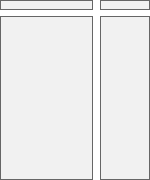
This template uses the following structure:
HomePageView
CCHTMLHeader
CCStylesChoice
CCThreadbar
CCHTMLFooter
The following table lists the items that Siebel CRM can map for this template. For more information, see About Mapping IDs to Placeholders.
Table Items Siebel CRM Can Map for the HomePageView Web Template
| ID | Placeholder |
|---|---|
101 |
Salutation Applet |
102 through 121 |
Applet |
201 through 220 |
Applet |
901 |
Layout Controls |
View Admin Template
The View Admin 1 template uses the ViewAdmin1 web template. It displays subviews as tabs across the start of the view.
The following table includes the generic layout that this template uses. You can use it in an administrative view that must display nonrelated views that are difficult to categorize.
Table Generic Layout of the ViewAdmin1 Template
This template uses the following structure:
ViewAdmin1
CCHTMLHeader
CCStylesChoice
CCThreadbar
CCViewbar_Tabs
CCSubViewbar_Tabs
CCHTMLFooter
The following table lists the items that Siebel CRM can map for this template. For more information, see About Mapping IDs to Placeholders.
Table Items Siebel CRM Can Map for the ViewAdmin1 Web Template
| ID | Placeholder |
|---|---|
5 |
Child Applet With Pointer |
6 |
Child Applet |
7 through 9 |
Grandchild Applet |
13 through 15 |
Grandchild Applet |
201 |
Mini-Applet |
View AdminTemplate With Grandchild Indented Applets
The View Admin 1 (Grandchild Indented) template uses the ViewAdmin1 (Grandchild Indented) web template. It is similar to the View Admin 1 template except that Siebel CRM indents the second and subsequent applets. You can use this template to display a hierarchical relationship or to display an administrative view that must include nonrelated views that are difficult to categorize. For more information, see View Admin Template.
The following table includes the generic layout that this template uses.

This template uses the following structure:
ViewAdmin1 (Grandchild Indented)
CCHTMLHeader
CCStylesChoice
CCThreadbar
CCSubViewbar_Tabs
CCApplet_Spacer
CCHTMLFooter
The following table lists the items that Siebel CRM can map for this template. For more information, see About Mapping IDs to Placeholders.
Table Items Siebel CRM Can Map for the ViewAdmin1 (Grandchild Indented) Web Template
| ID | Placeholder |
|---|---|
5 |
Child Applet With Pointer |
6 |
Child Applet |
7 |
Grandchild Applet With Pointer |
8 through 9 |
Child or Grandchild Applet |
10 through 12 |
Grandchild Applet |
13 through 15 |
Grandchild Applet |
201 |
Mini-Applet |
View Basic Template
The View Basic template uses the Smart Script Player web template. All applets use the full window width and are stacked on each other.
The following image includes the generic layout that this template uses.
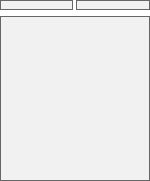
This template uses the following structure:
Smart Script Player
CCHTMLHeader
CCStylesChoice
CCThreadbar
CCHTMLFooter
The following table lists the items that Siebel CRM can map for this template. For more information, see About Mapping IDs to Placeholders.
Table Items Siebel CRM Can Map for the CSmart Script Player Web Template
| ID | Placeholder |
|---|---|
1 through 20 |
Applet |
101 |
Salutation Applet |
201 |
Mini-Applet |
901 |
Layout Controls |
View Catalog Admin Template
The View Catalog Admin template uses the ViewCatalog web template. It is a specialized view template that Siebel CRM uses only in a catalog view.
The following image includes the generic layout that this template uses.
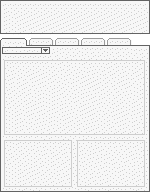
This template uses the following structure:
ViewCatalog
CCHTMLHeader
CCStylesChoice
CCThreadbar
CCViewbar_Tabs_DropList
CCHTMLFooter
The following table lists the items that Siebel CRM can map for this template. For more information, see About Mapping IDs to Placeholders.
Table Items Siebel CRM Can Map for the ViewCatalog Web Template
| ID | Placeholder |
|---|---|
1 |
Parent Applet |
2 |
Grandchild Applet |
3 |
Grandchild Applet |
4 through 5 |
Child Applet |
6 through 7 |
Grandchild Applet |
8 through 9 |
Grandchild Applet |
201 |
Mini-Applet |
View Detail Template
The View Detail template uses the PUB eCalendar Monthly View web template or the TOWViewDetail (Parent with Pointer) web template. It displays the following items:
Parent applet
Noncontext views that it displays as tabs
Categorized subviews that it displays in a drop-down list
Child applet
Multiple grandchild applets
The following image includes the generic layout that this template uses.
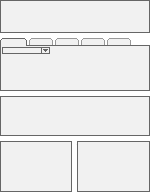
This template uses the following structure:
PUB eCalendar Monthly View
CCHTMLHeader
CCStylesChoice
CCThreadbar
CCViewbar_Tabs_DropList
CCHTMLFooter
The following table lists the items that Siebel CRM can map for this template. For more information, see About Mapping IDs to Placeholders.
Table Items Siebel CRM Can Map for the PUB eCalendar Monthly View Web Template
| ID | Placeholder |
|---|---|
1 |
Parent Applet |
2 |
Child Applet |
3 through 5 |
Child or Grandchild Applet |
6 through 7 |
Grandchild Applet |
8 through 9 |
Grandchild Applet |
201 |
Mini-Applet |
View Detail Template With Grandchild Indented Applets
The View Detail (Grandchild Indented) template uses the View Detail (Grandchild Indented) web template. It displays the same items as the View Detail template except that it indents grandchild applets. This indentation indicates a hierarchy. For more information, see View Detail Template.
The following image includes the generic layout that this template uses.
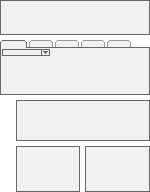
This template uses the following structure:
View Detail (Grandchild Indented)
CCHTMLHeader
CCStylesChoice
CCThreadbar
CCViewbar_Tabs_DropList
CCHTMLFooter
The following table lists the items that Siebel CRM can map for this template. For more information, see About Mapping IDs to Placeholders.
Table Items Siebel CRM Can Map for the View Detail (Grandchild Indented) Web Template
| ID | Placeholder |
|---|---|
1 |
Parent Applet |
2 |
Child Applet |
3 through 5 |
Child or Grandchild Applet |
6 through 7 |
Grandchild Applet |
8 through 9 |
Grandchild Applet |
88 |
Tree Applet |
201 |
Mini-Applet |
View Detail Two Template
The View Detail 2 template uses the ViewDetail2 web template. It displays the following items:
Parent applet
Noncontext views that it displays as tabs
Child applet
Categorized subviews that it displays as tabs
Multiple grandchild applets
The following image includes the generic layout that this template uses.

This template uses the following structure:
ViewDetail2
CCHTMLHeader
CCStylesChoice
CCThreadbar
CCViewbar_Tabs
CCSubViewbar_Tabs
CCHTMLFooter
The following table lists the items that Siebel CRM can map for this template. For more information, see About Mapping IDs to Placeholders.
Table Items Siebel CRM Can Map for the ViewDetail2 Web Template
| ID | Placeholder |
|---|---|
1 |
Parent Applet |
2 |
Child Applet |
3 |
Grandchild Applet |
4 through 5 |
Grandchild Applet |
6 through 7 |
Grandchild Applet |
8 through 9 |
Grandchild Applet |
201 |
Mini-Applet |
View Detail Two Template With Grandchild Indented Applets
The View Detail 2 (Grandchild Indented) template uses the View Detail 2 (Grandchild Indented) web template. It displays the same items as the View Detail Two template except that it indents grandchild applets. This indentation indicates a hierarchy. For more information, see View Detail Two Template.
The following table includes the generic layout that this template uses.
Table Generic Layout of the View Detail 2 (Grandchild Indented) Template
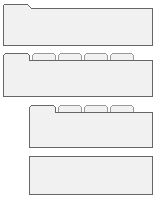 |
This template uses the following structure:
View Detail 2 (Grandchild Indented)
CCHTMLHeader
CCStylesChoice
CCThreadbar
CCViewbar_Tabs
CCSubViewbar_Tabs
CCApplet_Spacer
CCHTMLFooter
The following table lists the items that Siebel CRM can map for this template. For more information, see About Mapping IDs to Placeholders.
Table Items Siebel CRM Can Map for the ViewDetail2 (Grandchild Indented) Web Template
| ID | Placeholder |
|---|---|
1 |
Parent Applet |
2 |
Child Applet |
3 |
Grandchild Applet |
4 through 5 |
Child or Grandchild Applet |
6 through 7 |
Grandchild Applet |
8 through 9 |
Grandchild Applet |
201 |
Mini-Applet |
View Detail Template
The View Detail 3 template uses the ViewDetail3 web template. It is a specialized view template that does the following:
Displays all views as tabs
Displays a child applet beneath these tabs
Displays categorized subviews in a drop-down list
Displays multiple grandchild applets beneath the child applet
You can use it to display an administrative view that must include a collection of views that are not grouped and that visibility rules do not affect.
The following image includes the generic layout that this template uses.
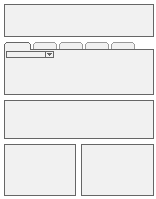
This template uses the following structure:
ViewDetail3
CCHTMLHeader
CCStylesChoice
CCThreadbar
CCViewbarAll_Tabs
CCSubViewbar_Drop
CCHTMLFooter
The following table lists the items that Siebel CRM can map for this template. For more information, see About Mapping IDs to Placeholders.
Table Items Siebel CRM Can Map for the ViewDetail3 Web Template
| ID | Placeholder |
|---|---|
1 |
Parent Applet |
2 |
Child Applet |
3 through 5 |
Grandchild Applet |
6 through 7 |
Grandchild Applet |
8 through 9 |
Child or Grandchild Applet |
201 |
Mini-Applet |
View Detail Three Template With Grandchild Indented Applets
The View Detail 3 (Grandchild Indented) template uses the View Detail 3 (Grandchild Indented) web template. It displays the same items as the View Detail Three template except that it indents grandchild applets. This indentation indicates a hierarchy. For more information, see View Detail Template.
The following table includes the generic layout that this template uses.
Table Generic Layout of the ViewDetail3 (Grandchild Indented) Template
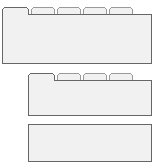 |
This template uses the following structure:
View Detail 3 (Grandchild Indented)
CCHTMLHeader
CCStylesChoice
CCThreadbar
CCViewbarAll_Tabs_DropList
CCHTMLFooter
The following table lists the items that Siebel CRM can map for this template. For more information, see About Mapping IDs to Placeholders.
Table Items Siebel CRM Can Map for the ViewDetail3 (Grandchild Indented) Web Template
| ID | Placeholder |
|---|---|
1 |
Parent Applet |
2 |
Child Applet |
3 through 5 |
Child or Grandchild Applet |
6 through 7 |
Grandchild Applet |
8 through 9 |
Grandchild Applet |
201 |
Mini-Applet |
View Detail Three Multichild Template
The View Detail 3 Multi Child template uses the ViewDetail3MultiChild web template. It is a specialized view template that displays the following items:
Displays all views as tabs
Displays a child applet beneath these tabs
Displays categorized subviews in a drop-down list
Displays multiple grandchild applets in a bounded box.
You can use it to display an administrative view that must include a collection of views that are not grouped and that visibility rules do not affect.
The following image includes the generic layout that this template uses.
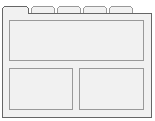
This template uses the following structure:
ViewDetail3MultiChild
CCHTMLHeader
CCStylesChoice
CCThreadbar
CCViewbarAll_Tabs_DropList
CCHTMLFooter
The following table lists the items that Siebel CRM can map for this template. For more information, see About Mapping IDs to Placeholders.
Table Items Siebel CRM Can Map for the ViewDetail3 Child Web Template
| ID | Placeholder |
|---|---|
1 |
Parent Applet |
2 |
Child Applet |
3 through 5 |
Grandchild Applet |
6 through 7 |
Child or Grandchild Applet |
8 through 9 |
Child or Grandchild Applet |
201 |
Mini-Applet |
View Detail MultiChld Template
The View Detail Multi-Child template uses the ViewDetailMultiChld web template. It displays the same items as the View Detail Three Multichild template. This indentation indicates a hierarchy. For more information, see View Detail Three Multichild Template.
The following image includes the generic layout that this template uses.
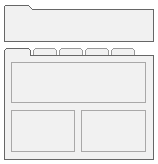
This template uses the following structure:
ViewDetailMultiChild
CCHTMLHeader
CCStylesChoice
CCThreadbar
CCViewbarAll_Tabs_DropList
CCHTMLFooter
The following table lists the items that Siebel CRM can map for this template. For more information, see About Mapping IDs to Placeholders.
Table Items Siebel CRM Can Map for the ViewDetailMultiChld Web Template
| ID | Placeholder |
|---|---|
1 |
Parent Applet |
2 |
Child Applet |
3 through 5 |
Grandchild Applet |
6 through 11 |
Child or Grandchild Applet |
201 |
Mini-Applet |
View Parent List With Tabs Template
The View Parent List With Tabs template uses the ViewParentListWithTabs web template. It displays the following items:
Parent applet
Noncontext views that it displays as tabs
Categorized subviews that it displays in a drop-down list
Child applet
Multiple grandchild applets
The following image includes the generic layout that this template uses.

This template uses the following structure:
ViewParentListWithTabs
CCHTMLHeader
CCStylesChoice
CCThreadbar
CCSubordinateAppletsBorderStart
CCViewBar_Tabs_DropList_Always
CCSubViewbar_Drop
dCCViewbar_Tabs
CCApplet_Spacer
dCCSubViewbar_Drop
CCSubordinateAppletsBorderEnd
CCHTMLFooter
The following table lists the items that Siebel CRM can map for this template. For more information, see About Mapping IDs to Placeholders.
Table Items Siebel CRM Can Map for the ViewParentListWithTab Web Template
| ID | Placeholder |
|---|---|
1 |
Parent Applet |
2 |
Child Applet |
3 through 5 |
Child or Grandchild Applet |
6 through 7 |
Grandchild Applet |
8 through 9 |
Grandchild Applet |
10 through 20 |
Grandchild Applet |
201 |
Mini-Applet |
702 |
Child Applet |
703 through 705 |
Child or Grandchild Applet |
Specialized Employee Templates
This topic describes specialized templates. It includes the following topics:
Columns Displayed Template
The Applet Items Displayed template uses the AppletItemsDisplayed web template. It is a specialized template that displays the Columns Displayed dialog box that is available on most lists through the applet menu. It includes specialized code that prevents Siebel CRM from using it for any other purpose. For more information, see Configuring How Siebel CRM Uses the Columns Displayed Feature.
This template uses the following structure:
AppletItemsDisplayed
The following table lists the items that Siebel CRM can map for this template. For more information, see About Mapping IDs to Placeholders.
Table Items Siebel CRM Can Map for the AppletItemsDisplayed Web Template
| ID | Placeholder |
|---|---|
1 |
Save |
2 |
Reset |
3 |
Cancel |
10 |
Available Items Label |
11 |
Available Items Combobox |
12 |
Available Items Hidden Field |
20 |
Move Item to Selected |
21 |
Move All to Selected |
22 |
Move Item to Available |
23 |
Move All to Available |
30 |
Selected Items Label |
31 |
Selected Items Combobox |
32 |
Selected Items Hidden Field |
40 |
Move Item to Top |
41 |
Move Item Up |
42 |
Move Item Down |
43 |
Move Item to Bottom |
91 |
Inside Applet Help Text |
100 |
Error Message |
1100 |
Outside Applet Help Text |
Dashboard Template
The Applet Dashboard template uses the AppletDashboard web template. It defines a lightweight version of the dashboard applet that displays the customer context in a call center application. It supports three rows. Each of these rows can include up to four columns. It displays labels at start of fields. You can use ID 211 to map a button that closes the dashboard.
The following image includes an example of this template.

This template uses the following structure:
AppletDashboard
The following table lists the items that Siebel CRM can map for this template. For more information, see About Mapping IDs to Placeholders.
Table Items Siebel CRM Can Map for the AppletDashboard Web Template
| ID | Placeholder |
|---|---|
211 |
Hide |
1200 |
Label |
1201 |
Label |
1202 |
Label |
1300 |
Field |
1301 |
Field |
1302 |
Field |
1700 |
Label |
1701 |
Label |
1702 |
Label |
1800 |
Field |
1801 |
Field |
1802 |
Field |
2200 |
Label |
2201 |
Label |
2202 |
Label |
2300 |
Field |
2301 |
Field |
2302 |
Field |
2700 |
Label |
2701 |
Label |
2702 |
Label |
2800 |
Field |
2801 |
Field |
2802 |
Field |
2901 |
Button |
2902 |
Button |
Email Response Template for Inbound Messages
The Applet Email Response - Inbound template uses the Applet Email Response - Inbound web template.
This template uses the following structure:
Applet Email Response - Inbound
CCApplet_Spacer
CCTitle_Named
CCFormButtonsTop
CCButtons
CCRecordNav
CCTogglebar_drop
CCFormButtonsTopRight
CCEmailRespFormInBound
The following information lists the items that Siebel CRM can map for this template. For more information, see About Mapping IDs to Placeholders.
Table Items Siebel CRM Can Map for the Applet Email Response - Inbound Web Template
| ID | Placeholder |
|---|---|
2 |
Back |
106 |
Query |
107 |
Go (ExecuteQuery) |
108 |
Cancel (Query) |
109 through 111 |
Control |
121 |
First |
122 |
Previous |
123 |
Next |
124 |
Last |
125 |
Info-Button |
131 |
New |
132 |
Edit |
133 |
Delete |
134 |
Reset |
135 |
Cancel |
136 |
Save |
139 through 143 |
Control |
150 through 152 |
Control |
160 through 164 |
Control |
192 |
Label |
194 |
Label |
580 |
New |
599 |
Save |
1131 |
Field |
1221 through 1226 |
Label |
1321 through 1326 |
Field |
1500 |
Required or Legend |
Email Response Template for Outbound Messages
The Applet Email Response - Outbound template uses the Applet Email Response - Outbound web template.
This template uses the following structure:
Applet Email Response - Outbound
CCApplet_Spacer
CCTitle_Named
CCFormButtonsTop
CCButtons
CCRecordNav
CCTogglebar_drop
CCFormButtonsTopRight
CCEmailRespFormOutBound
CCEmailRespFormButtonsBottom
CCEmailRespButtonsBottom
The following information lists the items that Siebel CRM can map for this template. For more information, see About Mapping IDs to Placeholders.
Table Items Siebel CRM Can Map for the Applet Email Response - Outbound Web Template
| ID | Placeholder |
|---|---|
2 |
Back |
91 |
Inside Applet Help Text |
106 |
Query |
107 |
Go (ExecuteQuery) |
108 |
Cancel (Query) |
109 through 111 |
Control |
121 |
First |
122 |
Previous |
123 |
Next |
124 |
Last |
125 |
Info-Button |
131 |
New |
132 |
Edit |
133 |
Delete |
134 |
Reset |
135 |
Cancel |
136 |
Save |
139 through 143 |
Control |
145 through 152 |
Control |
160 through 164 |
Control |
192 |
Label |
194 |
Label |
580 |
New |
599 |
Save |
1200 |
From |
1201 |
To |
1202 |
CC |
1203 |
Subject |
1204 |
Category |
1205 |
Body |
1207 |
Attachments |
1220 |
SR # |
1221 |
Opportunity |
1222 |
Contact |
1223 |
Account |
1224 |
Category |
1225 |
Closing |
1300 |
Label |
1301 through 1305 |
Field |
1306 |
Message Body |
1307 |
Field |
1320 through 1325 |
Field |
1401 |
Addr Book Icon |
1402 |
BCC |
1407 |
Icon |
1500 |
Required or Legend |
1502 |
Field |
1507 |
Icon |
Salutation Applet Template
The Applet Salutation template uses the AppletSalutation web template. It defines the salutation applet that Siebel CRM displays on a home page that includes a personal greeting.
The following is an example of this template.

This template uses the following structure:
AppletSalutation CCApplet_Spacer
The following table lists the items that Siebel CRM can map for this template. For more information, see About Mapping IDs to Placeholders.
Table Items Siebel CRM Can Map for the AppletSalutation Web Template
| ID | Placeholder |
|---|---|
1 |
Salutation |
Salutation Applet Template With Graphics
The Applet Salutation (Graphical) template uses the AppletSalutationGraphical web template. It defines a specialized salutation applet that Siebel CRM displays on a home page that includes a personal greeting. You can use ID 89 to map an image to this template.
The following image includes the generic layout that this template uses.

This template uses the following structure:
AppletSalutationGraphical CCApplet_Spacer
The following table lists the items that Siebel CRM can map for this template. For more information, see About Mapping IDs to Placeholders.
Table Items Siebel CRM Can Map for the AppletSalutationGraphical Web Template
| ID | Placeholder |
|---|---|
1 |
Salutation |
89 |
Image |
Screen Links Template
The Applet Screen Links template uses the AppletScreenLinks web template. You can use it to manually map controls, such as GoToView links. You can define a collection of these links that constitute a table of contents that the user can use to access information.
This template uses the following structure:
AppletScreenLinks
CCApplet_Spacer
CCTitle
CCFormButtonsTop
CCButtons
CCRecordNav
CCTogglebar_drop
CCFormButtonsTopRight
CCScreenLinks
CCBottomApplet
The following information lists the items that Siebel CRM can map for this template. For more information, see About Mapping IDs to Placeholders.
Table Items Siebel CRM Can Map for the AppletScreenLinks Web Template
| ID | Placeholder |
|---|---|
2 |
Back |
106 |
Query |
107 |
Go (ExecuteQuery) |
108 |
Cancel (Query) |
109 through 111 |
Control |
121 |
First |
122 |
Previous |
123 |
Next |
124 |
Last |
125 |
Info-Button |
131 |
New |
132 |
Edit |
133 |
Delete |
134 |
Reset |
135 |
Cancel |
136 |
Save |
139 through 143 |
Control |
150 through 152 |
Control |
160 through 164 |
Control |
192 |
Label |
194 |
label |
580 |
New |
599 |
Save |
1100 |
Group Label |
1101 through 1120 |
Link |
1200 |
Group Label |
1201 through 1220 |
Link |
1300 |
Group Label |
1301 through 1320 |
Link |
1400 |
Group Label |
1401 through 1420 |
Link |
1500 |
Required or Legend |
2100 |
Group Label |
2101 through 2120 |
Link |
2200 |
Group Label |
2201 through 2220 |
Link |
2300 |
Group Label |
2301 through 2320 |
Link |
2400 |
Group Label |
2401 through 2420 |
Link |
Send Mail Template
The Applet Send Mail template uses the AppletSendMail web template. It defines a specialized applet that Siebel CRM uses to create the send mail pop-up list.
This template uses the following structure:
AppletSendMail CCButtons CCPopupButtonsBottom
The following information lists the items that Siebel CRM can map for this template. For more information, see About Mapping IDs to Placeholders.
Table Items Siebel CRM Can Map for the AAppletSendMail Web Template
| ID | Placeholder |
|---|---|
152 |
OK |
153 |
Cancel |
154 through 158 |
Control |
300 through 301 |
Icon |
1200 |
From: Label |
1201 |
To: Label |
1202 |
Cc: Label |
1203 |
Bcc Field |
1204 |
Subject: Label |
1205 |
Body: Label |
1206 |
Optional Label |
1207 |
Attachments: Label |
1300 |
From Field |
1301 |
To field |
1302 |
CC Field |
1303 |
Bcc Field |
1304 |
Subject Field |
1305 |
Templates Field |
1306 |
Body Field |
1307 |
Attachments Field |
1400 |
Optional Control |
1401 |
AB Control |
1404 |
Control |
Send Mail Template for Picking Recipients
The Applet Send Mail Pick template uses the AppletSendEmailPick web template. It defines a specialized applet that the user can use to choose email recipients.
This template uses the following structure:
AppletSendEmailPick CCButtons CCPopupButtonsBottom
The following information lists the items that Siebel CRM can map for this template. For more information, see About Mapping IDs to Placeholders.
Table Items Siebel CRM Can Map for the AppletSendEmailPick Web Template
| ID | Placeholder |
|---|---|
142 through 143 |
Control |
144 |
Selected Row |
145 |
Control |
146 |
Save |
147 |
Pick Control |
152 |
OK |
153 |
Cancel |
154 through 158 |
Control |
501 through 540 |
Field |
598 |
Save |
1200 |
Label |
Site Map Template
The Site Map template uses the SiteMap web template. It creates a table of contents for the screens and views that exist in Siebel CRM.
This template uses the following structure:
SiteMap CCStylesChoice
You cannot map items for this template.
View Dashboard Template
The View Dashboard template uses the ViewDashboard web template. It defines a specialized view that Siebel CRM uses for the Dashboard applet. It can contain one applet that uses the full window width.
This template uses the following structure:
ViewDashboard
CCHTMLHeader
CCStylesChoice
CCHTMLFooter
You cannot map items for this template.
View Segment Detail Template
The View SME Segment Detail template uses the ViewSMESegmentDetail web template. It defines a specialized view that Siebel CRM uses in a tree and the expression builder.
The following image includes the generic layout that this template uses.
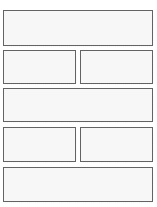
This template uses the following structure:
ViewSMESegmentDetail
CCHTMLHeader
CCStylesChoice
CCThreadbar
CCViewbar_Tabs
CCHTMLFooter
The following table lists the items that Siebel CRM can map for this template. For more information, see About Mapping IDs to Placeholders.
Table Items Siebel CRM Can Map for the ViewSMESegmentDetail Web Template
| ID | Placeholder |
|---|---|
1 |
Parent Applet |
2 |
Tree Applet |
3 |
Java Applet |
Wizard, Error, and SmartScript Templates
This topic describes other templates. It includes the following topics:
AppletWizard Template
The Applet Wizard template uses the AppletWizard web template. It defines wizards and SmartScript applets. It displays buttons at the end of the form that allow the user to navigate through a procedure. You can use ID 90 to map the applet title so that each step in the wizard can include a unique title. You can map text that occurs outside of the applet, such as the name of the running script, to ID 1100.
The following image includes the generic layout that this template uses.
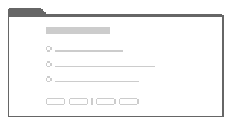
This template uses the following structure:
AppletWizard CCTitle_Mapped CCForm1ColBody CCButtons
The following table lists the items that Siebel CRM can map for this template. For more information, see About Mapping IDs to Placeholders.
Table Items Siebel CRM Can Map for the AppletWizard Web Template
| ID | Placeholder |
|---|---|
2 |
Back |
90 |
Title |
91 |
Inside Applet Help Text |
106 |
Query |
107 |
Go (ExecuteQuery) |
108 |
Cancel (Query) |
109 through 111 |
Control |
131 |
New |
132 |
Edit |
133 |
Delete |
134 |
Reset |
135 |
Cancel |
136 |
Save |
139 through 143 |
Control |
184 |
Title |
580 |
New |
599 |
Save |
1100 |
Outside Applet Help Text |
1301 through 1350 |
Required or Label or Field |
1500 |
Required or Legend |
2301 through 2350 |
Required or Label or Field |
Error Page Template
The Error Page template uses the Error web template. It displays system errors.
This template uses the following structure:
Error CCHTMLHeader CCBottomApplet CCHTMLFooter
You cannot map items for this template.
SmartScript Player Template
The SmartScript Player Applet (Player Only) template uses the SmartScriptPlayerApple web template. It defines SmartScript applets. It displays buttons at the end of the form that allow the user to navigate through a procedure.
The following table includes the generic layout that this template uses.
Table Generic Layout of the SmartScript Player Applet (Player Only) Template
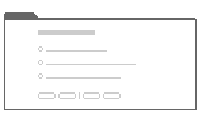 |
This template uses the following structure:
SmartScriptPlayerApplet
The following table lists the items that Siebel CRM can map for this template. For more information, see About Mapping IDs to Placeholders.
Table Items Siebel CRM Can Map for the SmartScript PlayerApplet Web Template
| ID | Placeholder |
|---|---|
1 |
Finish Script |
2 |
Cancel Script |
3 |
Previous Section |
4 |
Next Section |
5 |
Save Script |
6 |
Save Answers |
1500 |
Required Label |
SmartScript Player Template With Tree Only
The Smart Script Player Applet (Tree Only) template uses the SmartScriptPlayerAppletTree web template. It defines a tree applet that does not include an applet title or border.
The following image includes the generic layout that this template uses.
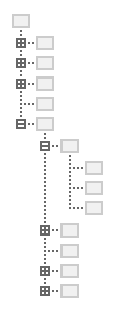
This template uses the following structure:
AppletTree
You cannot map items for this template.